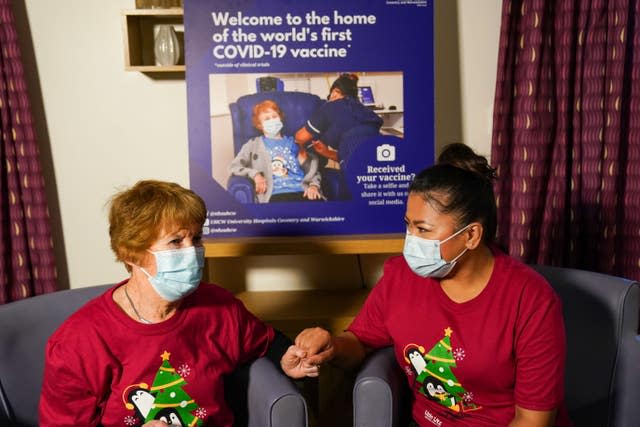Three doses of the Pfizer Covid vaccine ‘neutralises Omicron’, study suggests
Three doses of the Pfizer/BioNTech Covid-19 vaccine appear to neutralise the new Omicron variant, according to preliminary studies.
Pfizer and BioNTech said the antibody levels reached with three doses of the vaccine were just as good as for two doses against the original Wuhan strain of the virus, which have already been shown to offer high levels of protection.
Laboratory work found that two doses of the vaccine resulted in a significantly reduced effectiveness against Omicron, suggesting people can still get infected with the variant.
However, the firms said two jabs are still expected to work against severe disease owing to how the body uses a range of immune cells, including T cells, for protection.
The work showed that, when it comes to boosters, three doses of the vaccine increased neutralising antibody titers against Omicron in people’s blood 25-fold compared with two doses.

Pfizer and BioNTech said this showed that booster doses could offer good protection against Omicron.
In a statement, Pfizer and BioNTech said that two doses may still induce protection against severe disease, although people may still get infected.
The companies said the two doses “may not be sufficient to protect against infection with the Omicron variant.
“However, as the vast majority of epitopes targeted by vaccine-induced T cells are not affected by the mutations in Omicron, the companies believe that vaccinated individuals may still be protected against severe forms of the disease, and are closely monitoring real-world effectiveness against Omicron, globally.
“A more robust protection may be achieved by a third dose, as data from additional studies of the companies indicate that a booster with the current Covid-19 vaccine from Pfizer and BioNTech increases the antibody titers by 25-fold.
“According to the companies’ preliminary data, a third dose provides a similar level of neutralising antibodies to Omicron as is observed after two doses against wild-type and other variants that emerged before Omicron.
“These antibody levels are associated with high efficacy against both the wild-type virus and these variants.”
The firms said they were continuing to work on a variant-specific vaccine for Omicron and expected to have it available by March “in the event that an adaption is needed to further increase the level and duration of protection”.
For the small study on around 20 people, blood samples were obtained from people one month after they received a booster vaccination.
Some samples were from people who had received just two doses three weeks previously.
This latter group had, on average, more than a 25-fold reduction in neutralisation titers against the Omicron variant compared with the original Wuhan strain.
“Although two doses of the vaccine may still offer protection against severe disease caused by the Omicron strain, it’s clear from these preliminary data that protection is improved with a third dose of our vaccine,” said Albert Bourla, chairman of Pfizer.
“Ensuring as many people as possible are fully vaccinated with the first two-dose series and a booster remains the best course of action to prevent the spread of Covid-19.”
Ugur Sahin, chief executive and co-founder of BioNTech said: “Our preliminary, first dataset indicate that a third dose could still offer a sufficient level of protection from disease of any severity caused by the Omicron variant.
“Broad vaccination and booster campaigns around the world could help us to better protect people everywhere and to get through the winter season.”
Eleanor Riley, professor of immunology and infectious disease at the University of Edinburgh, said: “The press release from Pfizer provides reassuring information.
“Not only does a booster vaccination provide strong antibody-mediated neutralisation of Omicron but also the vast majority of the sites in the spike protein that activate T cells are conserved between Omicron and the vaccine strain.
“This suggests that a booster should provide high levels of protection against infection and severe disease.
“However, the data also show that two doses of vaccine are not sufficient to give high neutralising activity against variant viruses.
“This means that whilst two doses may be enough prevent severe disease they are not sufficient to control virus transmission.
“The message is clear: if we want to control virus transmission and avoid further restrictions, we need everyone who hasn’t yet done so to get vaccinated and to get their booster.”

 Yahoo Movies
Yahoo Movies 